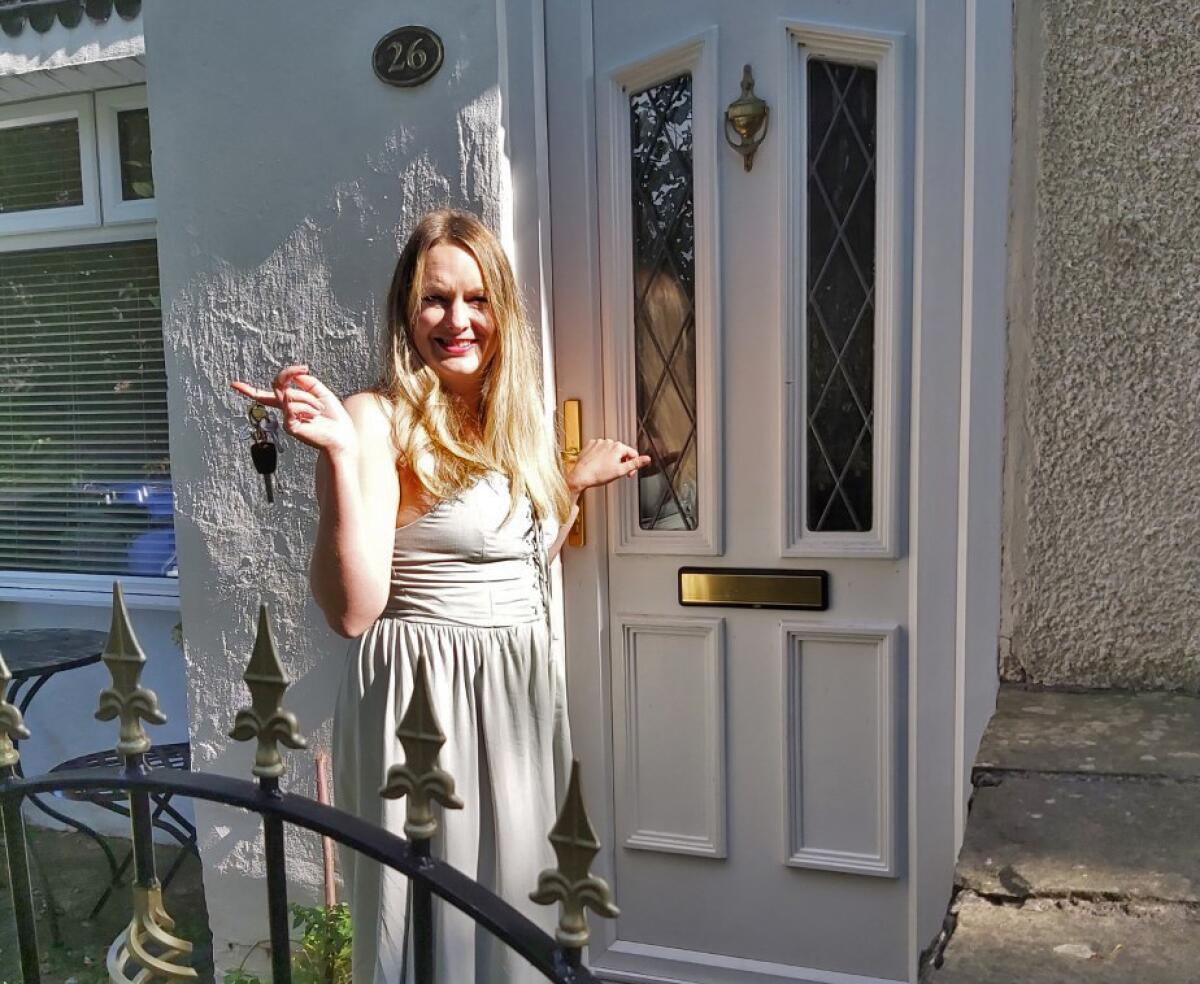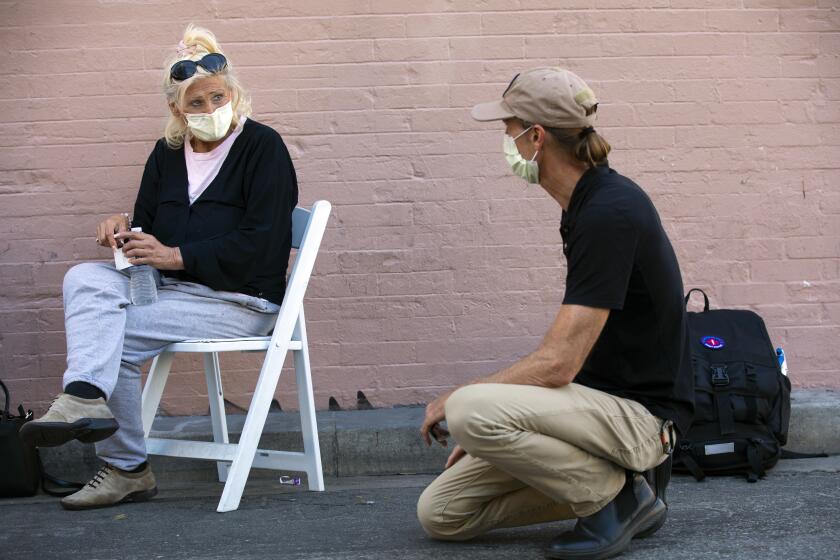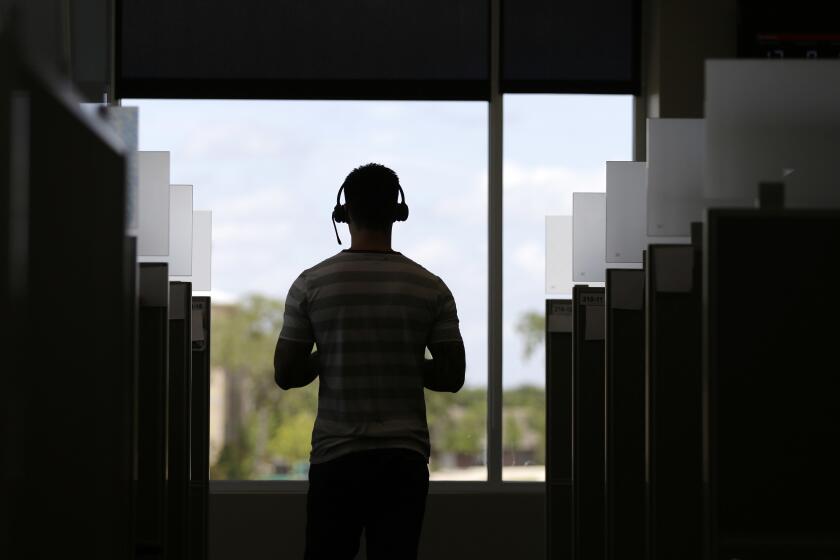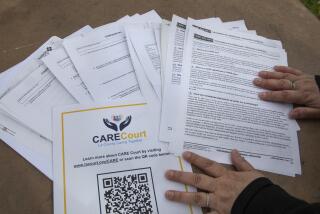How to help people in psychosis

- Share via
It was an April spring morning in Birmingham, England, and I had been experiencing severe symptoms of psychosis for two weeks. My only contact had been a kind flatmate making me dinner and leaving it outside my bedroom door.
At the time, I was convinced I was Britain’s most wanted criminal and that I was under surveillance by police. Holding this false belief, a symptom of a psychotic illness like paranoid schizophrenia, I felt overwhelmed and like the only way out was to kill myself.
I was lucky enough that, after my attempt, the sun started shining, and that offered me hope. I called emergency services for help — because a psychotic crisis needs to be treated in a hospital, by doctors and professionals, not by police officers, or in a jail.
The Times is publishing a series of personal essays by people who have all taken different approaches to mental health challenges.
I’m far from alone. About 3 in 100 people will experience psychosis at some point in their lives, according to the National Alliance on Mental Illness, and when they do, they’re at a marked increase of suicide attempts, self harm and death. It’s often missed that psychosis and psychotic illnesses like schizophrenia can be treated effectively. What’s crucial is getting support early. That’s where people like you are so important.
I want you to understand that you can help someone in a psychotic crisis — like the unhoused people you might see on the streets of Los Angeles who are exhibiting various symptoms of psychosis, or a friend of yours who is suffering. It might feel daunting, but it’s worth trying.
You’re walking down the street and you notice someone in distress. Should you stop and help? How? Mental health experts share the best steps to take.
It helped me during my crisis for other people to build on small glimmers of hope that are always around — the sunshine, a cool breeze, some good news on the TV or a nearby pet are all comforting in times of crisis.
However, psychosis crisis management isn’t one-size-fits-all. Friends and acquaintances with psychosis have told me that this wouldn’t work for them, and instead they would prefer to be listened to or guided by a trusted person with access to their personal safety plan (a plan devised by the patient and a professional while the patient is stable to mitigate future crises).
That said, there are still ways to help, regardless of someone’s preferred approach. For one, consider taking a Mental Health First Aid course, which trains you how to navigate a mental health or substance use-related crisis, regardless of whether you know the person, and includes steps you can take to help someone before a crisis emerges. It’s taught across the United States, including some free offerings. You can learn more at mentalhealthfirstaid.org.
Sophie Eggleton, who teaches similar courses, told me that the key thing in helping and comforting someone in a psychotic crisis is to not concentrate on fighting them on what they believe to be true at the time.
How To Save A Life
Pandemic stress, traumatic events and economic uncertainty have upended our world. This series aims to make the cascade of threats to your mental health a little easier to manage.
“Don’t stress them further by prioritizing what is true to you. Just make them feel cared for, reassured and listened to and focus on their safety,” Eggleton, a mental health instructor and podcaster, told me on Twitter. “It’s good to share that you are concerned for them but try not to show judgment even if what they’re saying is out of character or unusual. Try to stay calm and caring and if possible find out if they’ve experienced this before. If they have treatment in place they might be able to tell you what helps, or they might have a crisis team in place you can contact. Also try to take them to an environment where you both feel comfortable.”
What most mental health professionals like Sophie and people with psychosis like me agree on is that staying present, even if it’s just sending an upbeat text message, can be helpful when a crisis takes place. Reaching out to someone in a crisis can not only prevent a death, but also mean a person receives early support and experiences fewer relapses.
Feeling compassion and practicing empathy are also key to helping those in distress with psychosis.
If you can imagine for a moment how it might feel to think the world is out to get you, you may be able to build some compassion for a poor soul suffering acutely. Think of a time when your life was scary and out of control, and this will give you a glimpse.
“Probably the best thing you can do for someone in extreme distress is to empathize with the fear that is often associated with these experiences and obviously seek medical support when you can,” psychologist Paul Gilbert, who founded compassion-focused therapy, told me. “And you should contact a doctor urgently if the voices are indicating harm to self or others.”
Psychologist Charlie Heriot-Maitland offers similar advice in his recent book “Relating To Voices Using Compassion Focused Therapy.” To help someone in psychosis, he says, it’s best to first just be there and listen.
Bea and Edward Stricklan’s son has been diagnosed with schizophrenia. The brain disorder is treatable, but accessing adequate treatment has been difficult, if not impossible.
“If she is very distressed, then her mind is likely to be organized in such a way that it will be difficult for her to process and utilize my suggestions,” Heriot-Maitland wrote. “So instead, I’d get alongside her, listen, allow, hold, wait, until she feels safe enough to start generating her own wisdom, ideas, and plans … Warm, caring mental health workers will have the potential to help her feel calm, safe, validated, and understood.”
This was my experience in 2009 after my suicide attempt. Along with my kind roommate helping me stay fed, I was met with kindness from the medical team who arrived at my home when I called for them, including a nurse who encouraged me that I was going to be OK.
I was hospitalized and diagnosed with paranoid schizophrenia, a disorder where psychosis is the predominant feature. I stayed in a psychiatric hospital for only a week and responded well to an antipsychotic medication. So much good has happened since.
Suicide prevention and crisis counseling resources
If you or someone you know is struggling with suicidal thoughts, seek help from a professional and call 9-8-8. The United States’ first nationwide three-digit mental health crisis hotline 988 will connect callers with trained mental health counselors. Text “HOME” to 741741 in the U.S. and Canada to reach the Crisis Text Line.
I earned my master’s degree in creative writing, bought my own little whitewashed cottage in a small village and rekindled love with my childhood sweetheart, Paul. If you’d told me in 2009 that I’d be sitting in my own office, with my own kitty, my partner making breakfast, while I wrote for the Los Angeles Times, I would not have believed it. I thought my life was over after that diagnosis. But recovery is possible.
I’ve since been diagnosed with schizoaffective disorder, which is slightly less troublesome than schizophrenia. I learned to live with my paranoid thoughts, and as I did, they took a back seat to the real drivers of my life: love, family, and good food and drink. I’ve even started to drive my own yellow hatchback around the country lanes I live by.
As you drive down your own streets of Los Angeles, I implore you: Please don’t give up on people with psychosis, especially if you find them in a crisis. There’s hope — and treatment — for them. And sometimes, the first step is a kind soul noticing that they need help.
The new 988 number is meant as an alternative to 911. But how does it work? And is it safe to call?
More to Read
Sign up for Essential California
The most important California stories and recommendations in your inbox every morning.
You may occasionally receive promotional content from the Los Angeles Times.















